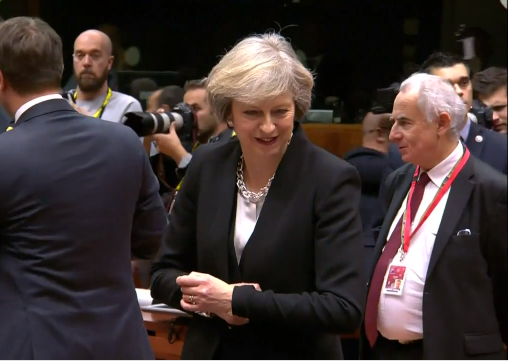The complexities of Brexit are beginning to dawn on Theresa May’s ministers
If a sovereign people can decide in a referendum to leave the EU, it follows that they must be able to change their minds once the implications of that decision have become clearer

The footage of Theresa May turning friendlessly to look for someone to talk to in Brussels on Thursday night was worth thousands of words on the effects of Britain’s vote to leave the European Union. So we need to expend no more words now on the disadvantages of cutting ourselves off from the biggest free-trade area in the world.
Let us instead praise David Davis, the Brexit Secretary, for his honesty in his evidence to the EU Select Committee this week. He repeatedly answered questions by saying, “I don’t know.” This contradicts the mythology of lesser practitioners of the art of politics, who hold that a leader should never admit to falling short of omniscience.
Mr Davis understands that, on the contrary, a frank acceptance of the limits of his knowledge enhances his reputation, especially among those who voted to remain in the EU and who are more suspicious of him.
Most striking was his confession that he did not know whether serving notice of our departure under Article 50 was revocable. The irreversibility of Article 50 has been one of the central points of agreement in the case before the Supreme Court about Parliament’s role in triggering it, but here was a cabinet minister admitting that the law was unclear but that, politically, it would be “very, very difficult to revoke”.
This cuts through the sterile legal argument to the political reality beneath: if a sovereign people can decide in a referendum to leave the EU, it follows that they must be able to change their minds once the implications of that decision have become clearer. Mr Davis does not want to admit it, but he is at least honest enough to contemplate the possibility.
It may be, as he suggests, unlikely that the British people will decide in 2019, by a sufficiently emphatic margin, that they do not like the look of life outside the EU. But it is welcome that he is prepared to concede the possibility.
Just as it was welcome that Philip Hammond, the Chancellor, said earlier this week that all “thoughtful politicians” favoured striking a transitional deal with the EU to smooth the shock of Brexit. The emerging consensus is that it could take as long as 10 years to negotiate the terms of our departure.
Sir Ivan Rogers, Britain’s ambassador to the EU, warned the Prime Minister in October that the talks could last a decade. When his comments were leaked on Thursday, they were brushed aside as merely the reporting by a diplomat of the views of many of the other 27 governments of the EU. But that makes the assessment more forceful rather than less – the whole point of this negotiation is that it has two sides.
A transitional deal – in effect postponing some of the full rigours of non-membership of the EU – appears logical. The only question is whether the EU 27 would grant us any of the benefits of membership temporarily. Let us hope so. One of the few incentives we can offer them is to point out that the longer the process takes, the more likely it is that it could be reversed.
Most of our European partners do not want to see us go, and if the process takes 10 years two things may happen. One is that the costs of leaving will become clearer. The other is that the EU itself will change. Who knows if the euro will survive that long? Who knows if the rules on free movement of people – currently sacrosanct – might prove amendable after all?
Seen in that historical perspective, Ms May’s handling of the Brexit pre-negotiations seems somewhat naive. She has implied that she will halt immigration from the EU and remove Britain altogether from the jurisdiction of the European Court the moment we leave in 2019. Neither seems realistic, but it is welcome that two of her most senior ministers, Mr Davis and Mr Hammond, have a better grasp of the complexities and timescale of the operation to sever a relationship that has been built up over nearly half a century.

Join our commenting forum
Join thought-provoking conversations, follow other Independent readers and see their replies